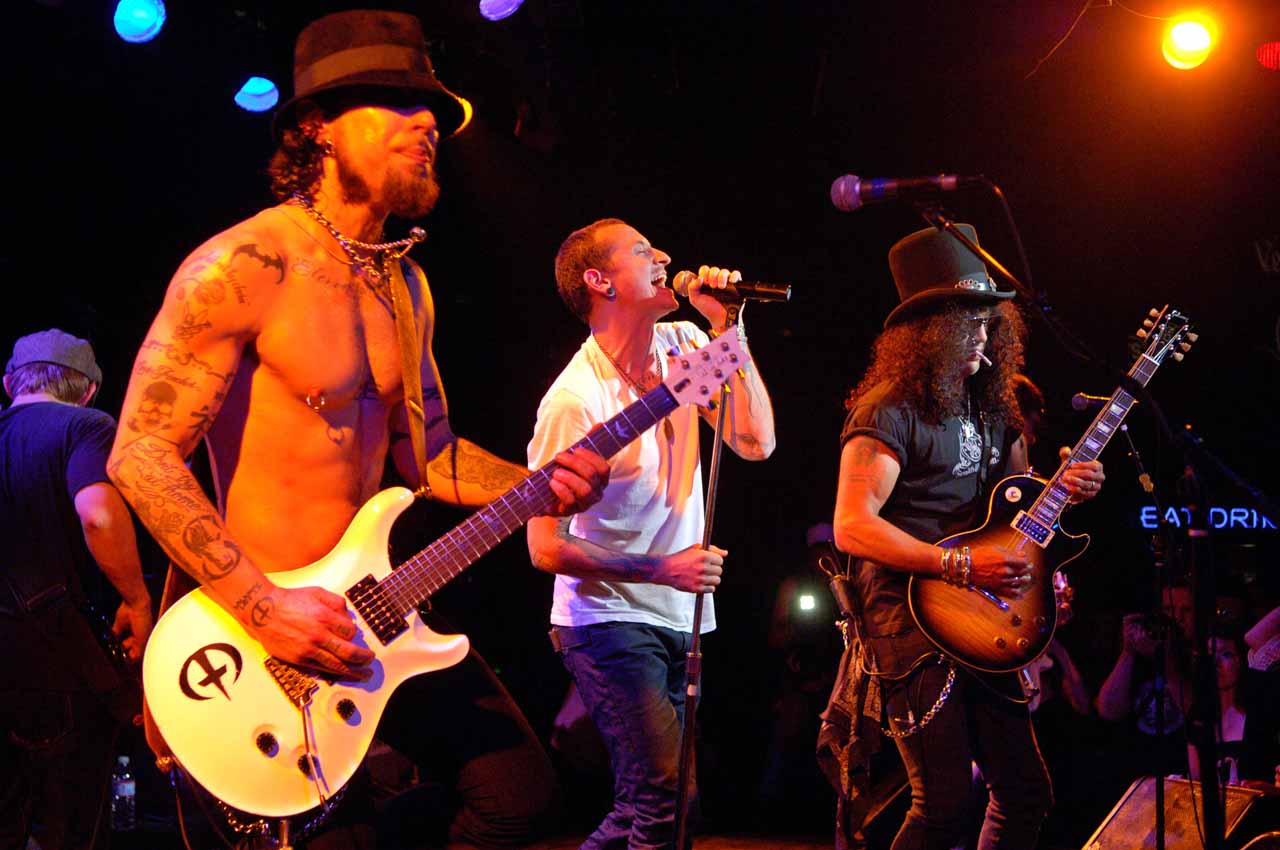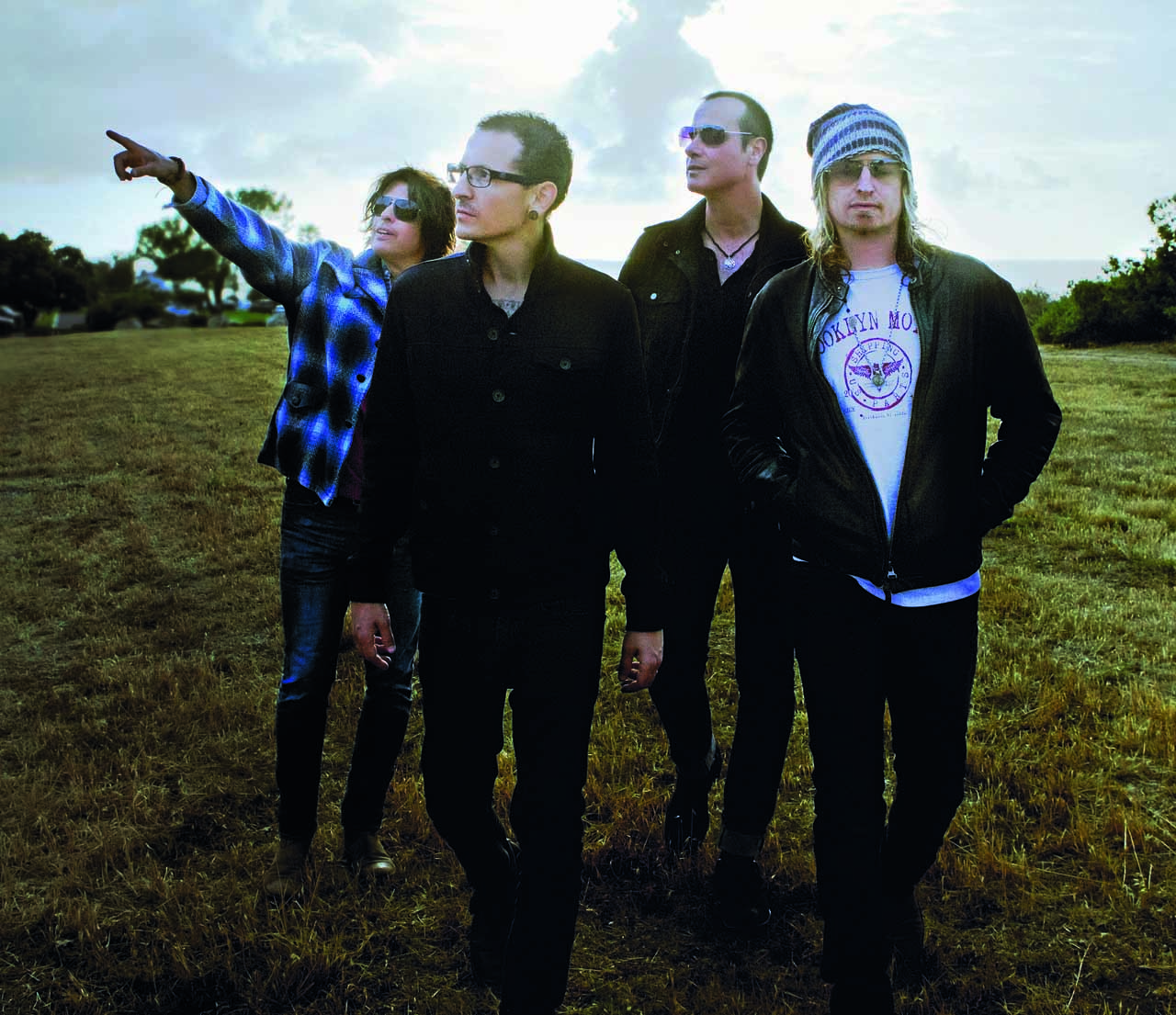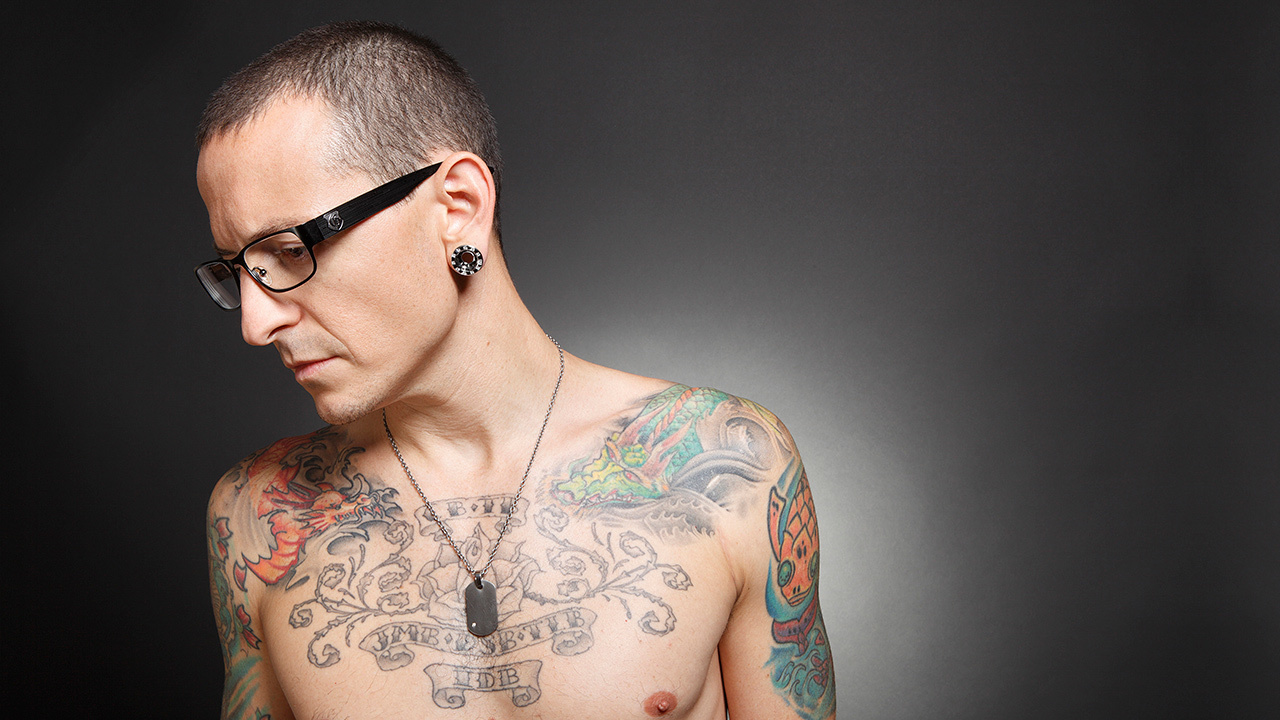Chester Bennington wasa dreamer. A recurring childhood fantasy of his was Depeche Mode flying their private jet into his schoolyard, scooping him up and proposing an abandonment of studies and a humdrum young life to become the fifth member of their group.
“I was always so excited [by that],” Bennington told me in a Metal Hammer interview in late 2000 just as his own career with Linkin Park began to gain traction. “We would perform a concert in front of my schoolmates and then fly off for a world tour together.”
Bennington’s make-believe tale never came true, but another product of his wild imagination, the one in which he joined Stone Temple Pilots, did.
The amazing reception to Linkin Park’s debut album, 2000’s Hybrid Theory, which sold 17 million copies, ensured that his adulthood was feathered by success on a scale that few rock musicians ever experience.
Bennington often spoke of the “dark thoughts” instilled in him by a difficult youth, but nobody expected the married 41-year-old father-of-six to commit suicide by hanging himself – on what would have been the 53rd birthday of Chris Cornell, one of his idols and friends, and in very similar circumstances to how the Soundgarden/Audoslave singer’s life ended.
To Chester’s great joy he had become a friend of Cornell, and was godfather to his son Christopher. When Cornell died, Chester paid tribute with the Leonard Cohen’s song Hallelujah at his private internment. ‘I did my best, it wasn’t much/I couldn’t feel, so I tried to touch,’ he sang that day in a choked-up voice. ‘I’ve told the truth, I didn’t come to fool you/And even though it all went wrong,I’ll stand before the Lord of Song/With nothing on my tongue but Hallelujah.’
It’s impossible to know what went through the mind of Chester Bennington on the morning of July 20 – just eight weeks after that tribute. Shortly after Cornell’s suicide, Bennington posted on the net of having dreamed of The Beatles the night before, and then watching a video of Cornell singing that band’s classic A Day In The Life. “I’d like to think you were saying goodbye,” he wrote.
Sadly, nobody got a chance to say goodbye to Chester Bennington.

Chester Bennington grew up in Phoenix, Arizona. At the age of 11 his parents’ divorce sent him into an anger-fuelled tailspin. He later confided that he had endured sexual abuse from an older male friend for four years. This would continue until he was 13. After his father gained custody he was physically bullied at high school and began using dope, LSD, cocaine, opium, booze and crystal meth. At 17, having moved back in with his mother, Chester’s drug taking caused her to eject him from the house. He later referred to his adolescence as “awful”, “lonely” and “scary”.
Between the ages of 10 and 14 he soaked up the Sugarhill Gang’s hip-hop and the music of rapper Slick Rick before diving into the punk scene. “Punk led me to rock’n’roll, then R&B, and I have started to appreciate classic rock like Led Zeppelin, The Who and Black Sabbath because I wanted to know where it all came from,” he explained.
By the early 1990s, when he began singing with a series of early bands, including post-grungers Grey Daze, Bennington was a bruised and wrathful young man. But, like so many others before him, music would become his salvation.
And yet, after struggling to make an impression, he almost gave it up. The phone call that changed his life came from an A&R man in Los Angeles who suggested Bennington should hook up with a band called Xero, who later evolved into Linkin Park. This was very much a last throw of the dice for him. After passing an audition, he moved his family to the West Coast.
There was an instant chemistry between Bennington, with his mainly rock-influenced vocal style, and co-frontman Mike Shinoda, who was very much a rapper. Together the band fused crunchy metal riffs with hip-hop beats, overlaid with electronic elements and samples from DJ Joe Hahn.
Just like so many other groundbreakers, Linkin Park were turned down by every record company in America, before an executive from Warner Brothers agreed to attend a behind-closed-doors showcase. By this point Bennington had co-fronted the group for nine months, and his patience and confidence were beginning to ebb away. Warners were sufficiently inquisitive to take a chance, despite the fact that they couldn’t hear a hit.
It was only after signing the contract that the band wrote the song that lit the blue touch paper: One Step Closer. Its parent album, Hybrid Theory, just 37 minutes long, tapped into the ADD-fuelled zeitgeist of the new internet era. Soon it was selling 50,000 copies a week.
“We like to call our music ‘mixed media’ because there’s more to it than just rap-rock,” Bennington told me back in 2000. “We’re trying to be the bridge between several different genres. Nobody out there sounds like us, and we sincerely believe that we are doing something unique.”
Despite the tip of the hat to Led Zeppelin et al, Linkin Park held the bloated old-school-influenced hard rockers of the 90s in disdain. “Nobody wants a song like November Rain by Guns N’ Roses any more – anything [that lasts for more than] five minutes is a freak,” Bennington boasted. For Linkin Park, this meant that Hybrid Theory was guitar solo-free. “We wanted everyone to want more; to go away and play it again when the record was over, instead of giving them too much,” the singer said.
It worked. Hybrid Theory reached No.2 in the US and has since been awarded diamond-selling status, placing it alongside such all-time greats as Led Zeppelin’s IV, Michael Jackson’s The Wall and Thriller, AC/DC’s Back In Black and Def Leppard’s Hysteria.
By the time he was 23, Bennington was the frontman for one of the biggest bands in the world. But despite the fame, status and financial rewards that this brought him, the confusion and sadness of the previous years never went away. “I’d wake up and have a pint of Jack Daniel’s to calm down,” he told writer Tom Bryant. “Then I’d pop a bunch of pills.”

This often meant not leaving the house, and instead he would simply hide alone in his closet. “I’d shack up in there in the dark and shake all day.”
Bennington was the last member to join Linkin Park, an out-of-towner and also their youngest member, but it was his addiction to alcohol and weed that really set him apart from the rest of the band. “I didn’t realise how big a problem it was, I thought they just didn’t understand me,” he admitted to Bryant. “They said that I was two people – Chester and then that fucking guy.”
In March 2003, when Hybrid Theory’s follow-up, Meteora, had chalked up six million sales in the US alone, having entered the Billboard chart at No.1, it became abundantly clear that Linkin Park were not, as some thought, just a flash in the pan. Although perhaps inevitably their rapid rise brought fans and haters in equal numbers, with critics largely falling into the latter category, the band had become bona-fide game changers – the saviours of the nu-rock explosion.
Bennington and Linkin Park were still getting used to it all. “You get a lot of people who say: ‘Jesus, you sold seventeen million albums, how are you going to top that?’ and they’ve so missed the point,” he told Metal Hammer. “They’ve mistaken us for a band that’s into this purely for success. It’s actually pretty upsetting to be seen simply as this ‘big-selling band’, it depersonalises you into a sales figure. It makes us into this overnight thing, which just isn’t the case.”
Many of the old frailties of the past remained. Meteora was mostly about being lied to.
“You don’t suddenly get issued with a new heart, a new soul and a new head when your record sells a few copies, y’know?” he observed. “You still have all of the same insecurities as before, maybe even a few more because the image people have of you is so incommensurate with the image you have of yourself. That’s partly why we’ve retreated into the music so deeply, as a way of reminding yourself who you are amid the bullshit that gets spoken about you.”
Meanwhile, collaboration with hip-hop superstar Jay-Z on the 2004 EP Collision Course confirmed Linkin Park’s entry to the league of A-Listers, although as Bennington later admitted to Classic Rock: “For rock fans in general, that might have been hard to swallow, but the average Linkin Park fan found it really exciting. A lot of hip-hop fans have since come up to me and said it turned them on to rock music, so in that sense it wasn’t a bad thing to do.”
Behind the scenes, in the three years between Meteora and its more experimental follow-up Minutes To Midnight, Bennington divorced his first wife, and also realised he needed to seek professional help in order to be able to get along with his bandmates.
“We did some counselling, and the guys really opened up and told me how they felt,” he said. “I had no idea that I had been such a nightmare until I got a good dose of ‘here’s what you’re really like’.”
Bennington got sober and prayed a lot, claiming to have “learned not to take God for granted any more”. Wearing a cross on a chain around his neck, he professed to be in the best shape of his life physically, mentally and spiritually.
Linkin Park’s third, fourth and fifth albums, Minutes To Midnight, A Thousand Suns and Living Things, all made in part with producer Rick Rubin (and aided by Mike Shinoda), continued the band’s escape from nu metal’s gravitational pull. Rubin, who had produced records for the Beastie Boys, Run-DMC, Slayer, the Red Hot Chili Peppers and Tom Petty among others, spoke highly of the band and insisted of Midnight: “It doesn’t sound like rap-rock. It’s a very melodic, progressive record.” Listen closely enough to that record and you’ll even hear a Mellotron!
At this point it could have been argued that nobody really knew who Linkin Park were any more, including the group themselves. Out of the blue, Paul McCartney declared himself a fan by joining the band and Jay-Z on stage during a televised appearance at the Grammy awards. “He said he liked our music and that he had our CD. It was a surreal experience,” a disbelieving Bennington marvelled.
When, back in 2007, I asked Bennington and Linkin Park bassist Dave Farrell whether they felt the band belonged in a magazine called Classic Rock, the pair stared at one another momentarily. “That’s a good question, man,” Bennington finally responded. “When I saw that Classic Rock were interviewing us, I thought: ‘This is a step up.’ And I hope that in the fullness of time we’ll be considered worthy of inclusion in such a magazine. We’re still a young band, but our ultimate goal is to keep on improving.”
When reminded of his wearied dismissal of November Rain, Bennington admitted: “GN’R are one of my favourite bands, and that’s a perfect example of how things change. People lose interest quickly these days. At six and a half minutes, The Little Things Give You Away could perhaps be considered [our own] November Rain. My only hope is that it gets to the punch a little quicker. Six years ago we’d have shaved three minutes off that song.”
Of course, Minutes To Midnight topped the Billboard chart, with first-week sales figures of 622,000 making it that year’s fastest-selling album so far. Equally inevitable, though, Linkin Park’s diehards slated the band for marginalising rapper Mike Shinoda and calling the album “completely boring”, “a fake piece of crap” and even “a sad joke”.

Away from Linkin Park, in 2005 Bennington co-founded a “darker and moodier” band called Dead By Sunrise. At around the same time, he divorced his first wife (he would later marry the former Playboy model Talinda Bentley). He was also among the names linked with succeeding Scott Weiland in Velvet Revolver in ’08.
And in May 2013, while there was still no offer from Depeche Mode, Bennington received the call he’d awaited all his life. His boyhood heroes Stone Temple Pilots had parted ways with their long-time lead singer Scott Weiland and sought a replacement. Bennington was thrilled to accept, and stayed with them for two years in tandem with his commitments to Linkin Park.
Last September he became a member of the supergroup Kings Of Chaos, which also included Matt Sorum, Duff McKagan, and Gilby Clarke as core members. However, the darkness never quite went away. In an interview he did this year, Bennington revealed how, during 2015 and ’16, he had spent “two years trying to hold my world together” due to “a bunch of stuff in my personal life that just went fucking crazy”. He talked about how he would attempt to stay out of the “bad neighbourhoods” that remained in his head.
And yet from the outside, nobody knew. Two weeks before Bennington took his own life at his home in Palos Verdes, California, he had appeared on top of the world. When Linkin Park played in London, photographer Awais Butt remarked that Bennington had “jumped around like a loon, smiling, looking totally ecstatic and giving it his all”.
On that same day, former Skin/Red White & Blues guitarist Myke Gray encountered the singer at the gym where he works. “After I told him I’m a big fan of his music, he shook my hand, looked me in the eyes and said: ‘Hi, I’m Chester.’ We talked about fitness and yoga and he was the sweetest guy. In sixteen years of personal training, that’s a very rare experience. Throughout the thirty minutes that we shared, I felt only good energy from him.”
Ironically, in one of his final interviews Bennington implored that people with self-destructive thoughts should “talk to someone about it”, adding: “I’m fortunate enough to be a member of some twelve-step programs. I know exactly who I am, I know exactly what I’m made of and I’m totally happy with it.”
If you need to talk to somebody about a problem, The Samaritans can be contacted by calling 116 123. The service is free. Also see www.samaritans.org. Linkin Park have set up a suicide prevention website at chester.linkinpark.com
Chester RIP
The stars pay tribute
“I am in tears. Chester had just told me how happy he was. He was such a sweet and talented man. Feel so sad for his family, band-mates and fans.” - Nikki Sixx
“Gracious, kind & humble – a rare combination in Rock & Roll. Deeply saddened.” - Lars Ulrich, Metallica
“We can never know someone’s pain. Prayers to Chester’s family in this tragedy. If you need help REACH OUT.” - Paul Stanley, Kiss
“Literally the most impressive talent I’ve ever seen live! Vocal beast!” - Pop singer Rihanna
“RIP, far too young.” - David Coverdale
“Jesus, no…’ - Corey Taylor, Slipknot/Stone Sour
“RIP, Chester B” - Duff McKagan
“RIP Chester Bennington. I still remember the 1st day I went in the basement at Warner Bros Records Burbank to hear you.” - Nile Rodgers, Chic
“RIP Chester” - Cypress Hill
“Artists are people compelled to bring beauty into a world that can be so dark. It makes sense then that artists are always conscious of darkness.” - Hayley Williams, Paramore
“When life leaves us blind, love keeps us kind. Rest easy, sir.” - Nickelback
“Bruv, I can’t lie I’m so upset. Serious.” - Hip-hop singer Stormzy
“So sorry to hear this news. Sending so much luv, strength & light to his family, kids and band.” - Dwayne ‘The Rock’ Johnson
“I am so shocked and saddened by this tragedy of yet another amazing artist taking his life.” - Sully Erna, Godsmack
Linkin Park’s Chester Bennington dead at 41
Jesse Leach appalled at lack of respect shown to Chester Bennington online

